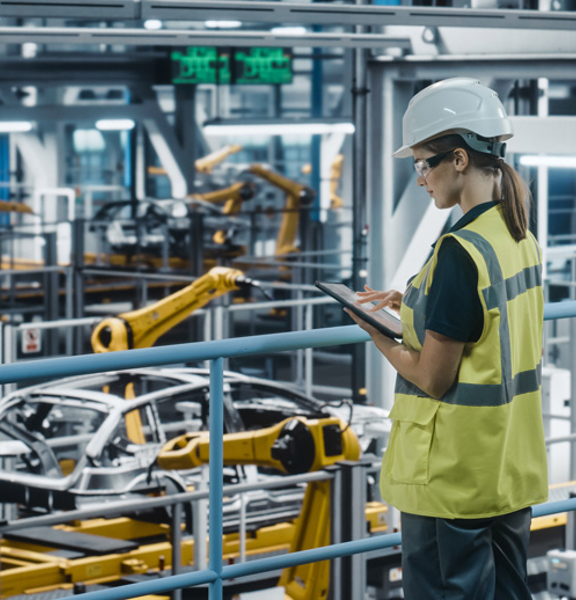Become a member
Take advantage of exclusive member benefits, world class events, networking and specialist support








 Become a member
Become a member 

The growth in the number of electric and hybrid vehicles available today demonstrates the automotive industry’s determination to act upon environmental concerns. Electric vehicles (EV’s) with their low or zero emissions are definitely becoming a highly strategic part of many OEMs' business strategies.
This continued growth in demand for electric vehicles brings with it the need for a huge supply of the lithium-ion batteries required to produce the power packs. In keeping with the automotive sector’s philosophy of automating manufacturing processes, battery production also needs to be automated, not only to keep pace with demand, but also to ensure the high standards of quality and safety required.
Stäubli robots are already recognised within the electrical and electronics sectors for their precision, performance and reliability, and this has led to a natural progression into battery manufacturing applications. In this article, Simon Jenkins - Sales Manager for Stäubli Robotics - expands on the different areas where the company’s robots are playing a leading role in the manufacture of lithium-Ion battery packs.
Re-chargeable batteries have been with us for some time and are present in many of our every-day home items including our phones, laptops, vacuum cleaners and power tools. The technology within these items is very similar to that now being used in many electric and hybrid cars, where the batteries are of the lithium-ion type. However the battery packs in vehicles contain significantly higher numbers of individual cells to produce the power, and deliver the longevity needed, to make electric vehicles viable.

With the compound annual growth rate (CAGR) for electric and hybrid vehicles alone estimated at around 35%, not to mention the increase in manufacture of energy storage facilities, which also use similar technology, it is clear that there is, and will continue to be for some time, a very high demand for lithium-Ion battery technology.
Lithium-Ion batteries come in a number of forms including Prismatic, Cylindrical and Pouch, however for automotive applications, the individual cells are predominately of the cylindrical variety, typically 3.7 volts and 2600mAh.

(Stäubli robots are at the heart of many assembly and process operations in the manufacture of battery solutions for EV’s)
Simon Jenkins explains the different processes where Stäubli robots are playing an increasingly important role. “The battery pack in an electric vehicle comprises of a number of battery modules, which in turn are made up from individual battery cells. Some EV’s may have around 3,000 individual battery cells, so as you can imagine automation plays a key role in the manufacture of these items.” Simon Jenkins continues: “Depending upon the specific configuration of the automated production system, the applications for our robots can differ. The typical process steps where our robots add value include: initial unpacking of individual cells, handling and transferring cells through cleaning, voltage and resistance testing, laser marking and segregation of any reject cells, before good cells are assembled into module bases”

(Stäubli’s TS2-60 SCARA robots are just one of the company’s range being used to handle battery cells and assemble EV battery packs)
The demand for battery packs, although significant from the major OEM’s, is just one of the growth factors within this sector. The development of increasing numbers of autonomous vehicles, together with a move towards replacing conventional petrol and diesel powered last mile delivery transport with electric powered alternatives will continue to place greater demand on battery manufacturers.
According to Stäubli’s Simon Jenkins “The EV revolution opens up tremendous opportunities for Stäubli, as our existing range of field proven robots dovetail neatly into this demanding production environment. In addition to the cleanliness, speed and precision, for which our systems are already renowned, we have recently introduced ESD compliant versions of some of our range, which makes them ideally suited for both applications in battery manufacture and motor assembly.”
Simon Jenkins, Sales Manager
Stäubli UK Limited
Hadley Park East,
Hadley,
Telford TF1 6QJ
TEL: +44 1952 671917
Web: www.staubli.com